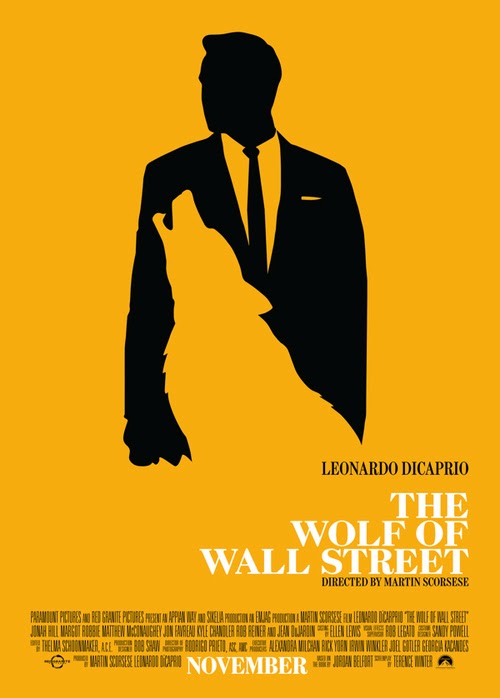 ‘The
Wolf of Wall Street’ sees Leonardo Dicaprio and Martin Scorsese collaborate for
the fifth time. A partnership that clearly works, both are masters of their
craft and at the absolute pinnacles of their career, anything they put their
names on now turns to gold and it is in such high reverence that the public
hold their name, future historians will look at their collaborations in the
same league as Lennon and McCartney. Of all of the Leo/Marty collaborations,
Wolf is clearly their finest. It is the most ‘Scorsese’ of all five pictures,
it feels like a proper Scorsese film, and for Leo it may just be the finest
performance of his career, which is incredible as he has never given a bad
performance.
‘The
Wolf of Wall Street’ sees Leonardo Dicaprio and Martin Scorsese collaborate for
the fifth time. A partnership that clearly works, both are masters of their
craft and at the absolute pinnacles of their career, anything they put their
names on now turns to gold and it is in such high reverence that the public
hold their name, future historians will look at their collaborations in the
same league as Lennon and McCartney. Of all of the Leo/Marty collaborations,
Wolf is clearly their finest. It is the most ‘Scorsese’ of all five pictures,
it feels like a proper Scorsese film, and for Leo it may just be the finest
performance of his career, which is incredible as he has never given a bad
performance.
‘The
Wolf of Wall Street’ fits in perfectly alongside its cinematic relatives ‘Goodfellas’
and ‘Casino’, built within the same framework, sharing the same vernacular and
message, to what extent is it ok to be a criminal? Wolf is a crime film just as
much as ‘Goodfellas’, if not more. Jordan Belfort is perhaps a smarter, more
charming criminal therefore all the more effective. The template of ‘Goodfellas’
is used to soaring effect, that classic Marty style is all over the picture.
Finally a movie that feels like real cinema, every frame screams iconography of
modern American film-making, a modern classic of modern times, which is a very
rare thing these days. The extent to which ‘Wolf’ is linked to ‘Goodfellas’ is
monumental, it feels like its counterpart, the distinction between work (crime)
and family life, the highs the lows, tracing all of this excess and debauchery from
its most humble naive beginnings and culminating in such pandemonium only
Scorsese could pull it off with such gallows hilarity. Even Leo’s dark hair and
piercing blue eyes scream Ray Liotta.
Why
are there distinct similarities between ‘Wolf’ and ‘Goodfellas’? Why are such parallels
being drawn? Comparing criminal activity in the mob to the white collar crime
on Wall Street? Or is it that both of these films aren’t about crime at all,
but a critique on the American dream, and the extent to which society will
allow you to behave atrociously and irreverently to attain it. At what cost?
Jordan Bellfort was a criminal, through and through. He was ripping people off
and making millions of dollars in doing so, but he was living the dream, big
house, nice cars, beautiful wife, 170 foot yacht, who is seriously going to
hate this guy over envying him? This is where the film succeeds, the reason we
like these despicable characters is that it is a despicability that we are all
willing to ignore, and such irreverence we would all most likely replicate
given the opportunity. The same reason we love Henry Hill in ‘Goodfellas’
despite his despicable actions, because the American dream is worth attaining
no matter what the cost. No matter who you have to step over in doing so, the
dream is worth it.
The
only criticisms that have been made about ‘The Wolf of Wall Street’ time and
time again are those that it is too much. It is too explicit, too sexual, and
too outrageous. Thus we come onto the subject of the ever growing conservative
threat of film censorship, which in recent years has become more of a threat to
creating real art than it was in the days of the ‘Haze Code’. As we progress
further into post 9/11 political correctness, such Orwellian surveillance of
what is right and wrong in all art forms has sought to threaten our very right
to express ourselves. Criticising a film such as ‘Wolf’ for displaying explicit
behaviour is so concerning, not only for Film itself but for our cultural
understanding and appreciation of art, and what that word actually means. As
culture continues to be liquefied by reality TV, Social networking, Celebrity
and the internet, it is offensive that real artists, a true auteur such as
Scorsese must justify himself and his artistic decisions to a halfwit frenzied
population who know nothing about the art they’re criticizing or its
significance to our cultural history.
‘Wolf
of Wall Street’ is a landmark film in American film-making, as we progress into
the murky waters of tomorrow, we do not know what lays ahead for the future of
film. Film has never been more appreciated by the masses, the demand for cinema
has never been stronger, the industry has never had such a high level of talent
from all over the world at its disposal. Veterans such as Scorsese are still
making some of the greatest work of their careers, and new comers are proving
that the future is bright for cinematic art. However, the truth is that it is
becoming harder and harder to make great pictures in the face of an ever
degrading culture. The desire for film has never been more prevalent yet the understanding
of our own culture and its history is beginning to dissipate as art continues
to be compromised by ignorance.
No comments:
Post a Comment